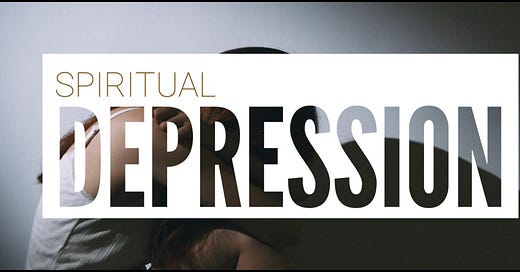"Set your minds on things that are above, not on things that are on earth." Colossians 3:2
Listen to the audio version:
BIBLICAL FACTS
Demonic oppression and clinical depression are often discussed in different spheres, yet there are instances where the spiritual and psychological realms may intertwine, leading to a complex overlap.
Demonic oppression, as understood in spiritual contexts, involves supernatural forces influencing an individual's mental, emotional, and sometimes physical state, often manifesting in ways that mimic or exacerbate psychological disorders.
Clinical depression, recognized in the medical field, is a condition characterized by persistent sadness, loss of interest, and various cognitive and physical symptoms, which frequently overshadows spiritual depression. The challenge lies in distinguishing between the two, as the manifestations of demonic oppression can hide behind the clinical diagnosis of depression, complicating treatment and understanding.
This overlap calls for a Biblical approach that considers both spiritual and psychological dimensions, ensuring that individuals receive comprehensive care addressing all potential influences on their well-being. While clinical interventions can be misguided and obtrusive, incorporating spiritual discernment and support can provide a fuller path to healing for those facing such profound struggles.
Yet most turn to the clinical over that of the Biblical!
Fact, when you attempt to sedate oppression, the individual’s symptoms frequently increase, causing symptom rebound. Often known as the medication’s side effects are more dangerous than the person’s initial depression - ultimately plaguing individuals with tardive dyskinesia.
Tardive dyskinesia (TD) is a neurological disorder characterized by involuntary, repetitive movements, often affecting the face, tongue, and limbs. It is most commonly caused by long-term use of antipsychotic medications, which are used to treat conditions like demonic depression, clinical depression, bipolar disorder, and a host of other mental issues. Symptoms can include lip-smacking, grimacing, rapid eye blinking, and involuntary movements of the arms and legs. Unfortunately, outside of healing by God, TD is often not reversible, spurring on more medications with additional side effects.
The mounting side effects of antipsychotic drugs are a growing concern for both patients and healthcare providers. These medications, while minimally effective in managing symptoms of mental health conditions, can lead to a range of adverse compounding effects. Common side effects include weight gain, metabolic changes, dry mouth, and movement disorders like tardive dyskinesia. More severe side effects can include abnormal heart rhythms and neuroleptic malignant syndrome, a potentially life-threatening condition.
The challenge lies in balancing the supposed therapeutic benefits of these drugs with their potential risks, necessitating careful monitoring and individualized treatment plans to minimize harm while maximizing efficacy. However, there is a better place to start - considering spiritual therapy, Biblical discipleship.
THE TOP TEN SPIRITUAL REASONS
Spiritual depression is a profound sense of sadness, emptiness, and disconnection that extends beyond typical depressive symptoms to deeply affect one’s spiritual life and beliefs, ultimately rejecting God over that of selfish choices.
Individuals experiencing spiritual depression may feel distant from their supposed Life in Christ, struggle with a loss of purpose, and grapple with doubts about their spiritual journey, while developing a habitual act of rejecting the solutions offered in the Word.
This condition can be triggered by various factors such as personal traumas, existential crises, or beliefs of guilt and inadequacy within one's spiritual practices. Unlike the worldly label of clinical depression, which primarily focuses on psychological and physical symptoms, spiritual depression is centered on one's relationship with God and Yeshua and their sense of spiritual well-being. Addressing spiritual depression requires a spiritual approach with a spiritual leader, incorporating both psychological support and spiritual guidance to release healing and reconnection by releasing the Holy Spirit from within.
Spiritual depression can stem from various factors, often involving a combination of personal, emotional, and spiritual challenges. Here are ten common reasons:
Traumatic Events: Experiencing trauma can shake one's faith and lead to beliefs of abandonment by God Himself.
Moral or Ethical Struggles: Internal conflicts about moral inadequacies or ethical dilemmas can cause paralyzing spiritual distress.
Spiritual Unanswered Questions: Unanswered questions about life's purpose and meaning can lead to spiritual depression.
Spiritual Body-Life Issues: Conflicts or beliefs of exclusion within the church community can contribute to a sense of isolation.
Neglecting Spirituality: Failing to prioritize spiritual teachings and practices like prayer, meditation, Bible reading, or attending services can lead to a sense of disconnection that leads to isolation, which activates spiritual depression.
Selfish Behavior: Questioning or doubting one's faith through self-manufactured beliefs can create beliefs of hopelessness and discouragement. Since all of humanity falls short of creating organic TRUTH, self-produced beliefs result in failure - every time.
Past Sins: Guilt and shame over past sins can weigh heavily on one's spiritual well-being. Since the Cross of Christ was meant to address this issue, self-manufactured guilt fades into oppression.
Life Challenges: Everyday stressors such as job loss, financial troubles, or relationship problems can impact spiritual health and a worldview of God, it typically results in humanity’s disappointment IN God. Oppression settles in at this point, which hides its ugly head in the worldly fable of “depression.”
Excessive Self-Examination: Constantly scrutinizing oneself for spiritual shortcomings can lead to beliefs of inadequacy. Classically, this is due to a refusal to allow the Life of Christ to examine their life authoritatively.
Mental Health Habits: Overall, self-proclaimed Christians are known for poor psychological patterns, which activate anxiety that frequently exacerbates spiritual struggles. Mental disorder, an unorganized mind, is likely the leading cause that activates the above list.
Understanding these factors can help in addressing and overcoming spiritual depression. If you're experiencing any of these, it might be helpful to seek out a spiritual advisor - one who has a Biblical perspective of the importance of the believer’s identity in Christ.
What to do:
Start by isolating the problem with a qualified discipler, minimally a therapist with a Christ-as-Life perspective.
Read the book of Romans. Afterward, go back and study each verse thoughtfully.
Study the book of Galatians. This book clearly reveals what happens to believers who embrace worldly ideologies. Go through my series on the Galatian Giants HERE.
Action wise, do the opposite of the itemized top ten reasons noted above.
Finally, consider going through the “Knowing Identity Matters” study HERE.
Spiritual depression may be triggered by a crisis of faith or existential questions, and clinical depression by more general life stressors or trauma, the root causes often overlap, if not being the same - leading to similar emotional and psychological experiences.
Understanding this connection can help in addressing the root cause of both types of depression - both being tools of God’s enemy to retard a connection to either needing Christ as you redeemer or setting you free through the Life of Christ from the inside out.















Share this post